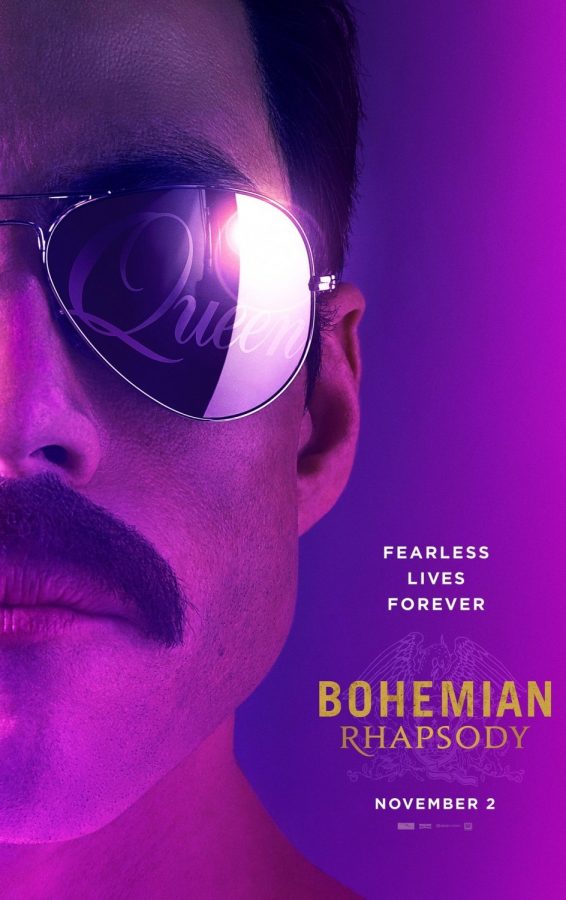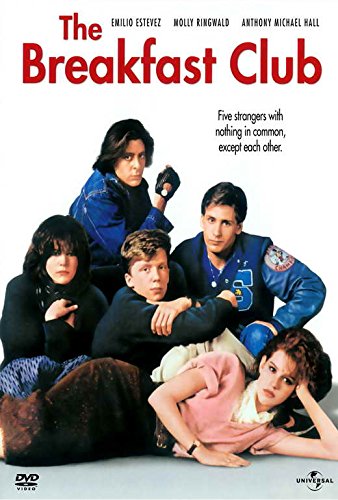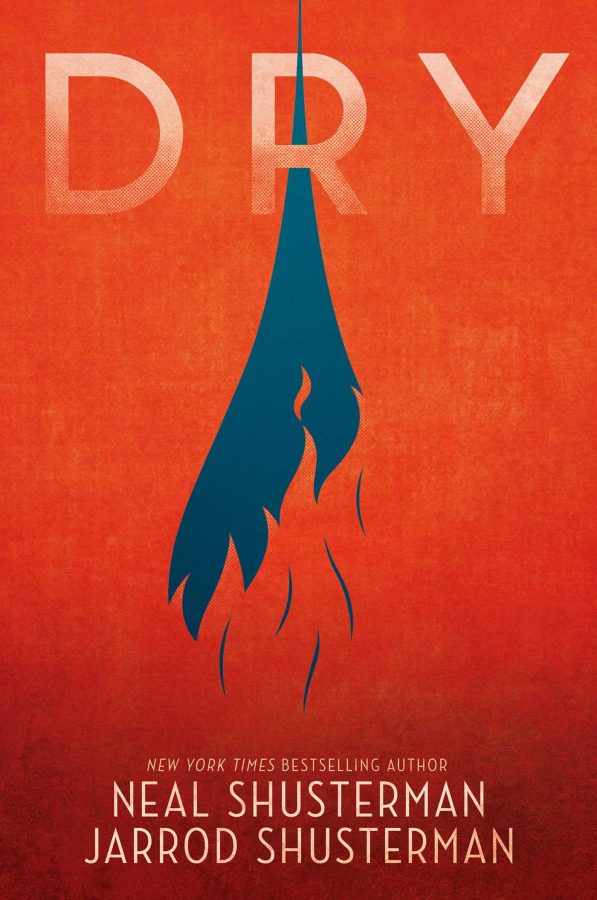Bohemian Rhapsody is a biography film focused on the life of rock band Queen’s frontrunner, Freddie Mercury—played by Rami Malek—and his rise to stardom, journey of self-discovery, and eventual succumbing to the AIDs virus. The film begins like every bio-flick, showing Mercury’s roots as the child of Parsi immigrants, with a head full of dreams, but stuck in the reality of working at London’s Heathrow airport. In the beginning, Mercury finds himself replacing the lead vocalist for local rock band Smile—ironic given the overbite Mercury had and Malek adapted to—which in time the band would change to Queen. While his family calls him Farroh and the band just thinks of him as Pakistani, Freddie Mercury wants to so desperately be seen by others as the man he sees in the mirror in all his outrageous showmanship.
Malek’s confidence and bravado is titillating, quite different from the more passive and masked character he’s known for thanks to television series Mr. Robot. He played the part with all the flamboyant accuracy possible. The film credits Mercury for inventing basically all the aspects of Queen we know and love—which seems a bit egregious. And while the performance of Lucy Boynton as Mercury’s once-wife Mary Austen is believable and holds emotional weight. The film portrays Mercury realizing his sexuality while still on tour—in between a phone call with his wife—all the while she knows he’s not straight, is quite perplexing. But what’s most disappointing about Bohemian Rhapsody comes from the completely inaccurate representation of Mercury and his struggle with his sexuality; the film portrays Mercury as not wanting to be gay — which couldn’t be any farther from the truth. For the longest time, Mercury is portrayed as denying himself of being gay, despite how obvious it’s made to the viewers. When he finally gives into this orientation and accepts his homoerotic urges, he publically masks it and takes great offense to even the preponderance of him being gay. The way his homosexuality is portrayed comes across as malevolent, seemingly implying that with Freddie’s revelation of who he was, he slowly became more selfish and sinful until it almost cost him everything. And even if this all true, even if Mercury really was this uncomfortable with his sexuality at a time and that his urges really did come to take control of his life, the script’s PG-13 sugar-coating of the sexual, drug-fueled side to Mercury makes me not believe a line of what the movie is trying to force-feed me.
But while the film hammers away at the homosexual icon label placed on Mercury, it chips away at what Queen actually accomplished as a band versus what Freddie did and what his underlings followed along with. The vision for the titular Bohemian Rhapsody? Mercury’s idea, which the band went along with and defended to label executives. Mercury directed where the band’s sound went, regardless of if the rest of the band understood it. The film would then flow up until the band’s breakup as if you were reading the track list off of Queen’s Greatest Hits, showing how ‘No — Freddy didn’t do everything for Queen’ and that in fact John Deacon, Brian May, and Roger Taylor were instrumental in the creation of some of Queen’s other songs. But because this was meant to be Freddie Mercury biopic and its title was Bohemian Rhapsody, of course the song and his importance were given priority. The problem with this is that everyone but Mercury is still alive today, meaning that they would influence the film’s direction how they believed Freddy would’ve wanted, but not necessarily with total accuracy. And as Queen began to splinter, Mercury’s descent into loneliness was moving at full speed, slowly derailing itself with indulgences. This drug-infused lifestyle, incited by lover and manager John Prenter, slowly begins to rot away the family that Queen had become and turning Mercury into a solo career.
And while there were many jokes that brought laughs during these recording interims, from the 42 “Galileo’s” by Roger Taylor to Taylor’s insistence on including a song about loving his car, it brought the film a campy feel in the first act that was almost entirely lost by the end. The third act shows Mercury solo, living in a London mansion and trying to succeed on his own with only Prenter at his side. It’s here that Prenter loses the caring charm his character once had and devolves into a mustachio menace akin to antagonists. And here, the debauchery cranks up to an 11, showing how Mercury’s entire life being dictated by leather and a whole lot of drugs. It’s a long and arduous act, filled with confrontations between Mercury and almost every important character from the film and constant reminders of how “conflicted” he is before coming to terms with his contracting the AIDS virus.
So Mercury ties up all the plot’s loose ends and goes back to some clean-up crew member he’d confided in years before and had a one-night stand with, before revealing to his family his sexuality and then to Queen his illness after re-forming the band. They agree to take part in Live AID, a 1985 charity festival which Queen came back to perform for. The film had opened up on Mercury’s climbing on stage, so as you can expect this was the culmination of everything the film set up. It’s a huge spectacle, with a huge, unleashed crowd and an almost full performance of Bohemian Rhapsody.
And then it just ended.
The film comes to a close with the seemingly rushed Live AID performance, which while honestly depicted and cathartic upon viewing, comes across as pushed for time, resulting in an unfulfilling conclusion. We get the cliche photos-plus-text montage most bio-flicks end with, revealing what happens to everyone after the movie as if they weren’t going to google it the second they left the theater. But that’s where the film ends up burdened by its own hubris; the timeline is completely inaccurate, rushing Mercury’s finding out he has AIDS to a few years early all for some emotional pay-off, on-top of manipulating the landmark moments of Queen’s history to more quickly move the film along, something any quasi-loyal Queen fan would’ve picked up on. The film is not properly advertised. There’s no Freddie Mercury POV, but rather a disjointed slideshow of important moments in his and the band’s life. An alien camp at random intervals, chugging along until showing why they had to put every single best-selling Queen song onto it’s undeniably-strong soundtrack.Bohemian Rhapsody is a film that tries to pretend its something its not. Facts are forgotten to weave a better fiction, once pivotal characters are diluted into almost-comical archetypes, and Malek himself is denied the respect his performance would’ve garnered. It’s a film that took potential and squandered it, but with its shortcomings created a movie easy to mindlessly enjoy. All it has is an almost uncanny performance by a talented lead surrounded by thoughtless shortcomings and honestly-trying co-stars, all hampered by a poor script. There was a time when a R-rated, truthful history of Mercury and Queen was on the table, staring everyone’s favorite Kazakhstan citizen Sacha Baron Cohen— but he left because Queen’s living members were being picky. The rest of Queen were both the music producers and screenplay advisors, with Queen’s manager Jim Beach being given the “produced by” credit. They were the ones who could comment on historical accuracy, and as such they had the power to change the film how they see fit. A similar scenario happened behind the scenes with the production of Straight Outta Compton. Every member of NWA but Eazy-E is still alive, so as such they were able to include historically inaccurate scenes about Eazy-E that had no foundations and only went to slander his character. Queen did the exact same thing. They didn’t want to tell everything about Mercury, instead they wanted to cherry pick the moments of his life that “best reflected the legacy of Queen,” which is why the final product was so disappointing. If you’re going to make a movie about Freddie Mercury, make it about Freddie Mercury—who he was and what he went through—not the diluted drama that seems more fit to be a free bonus in every physical Queen CD.
1.75/5 STARS
















































